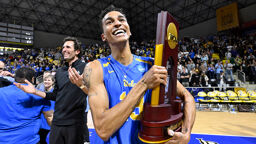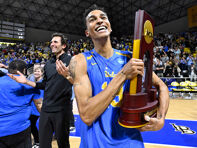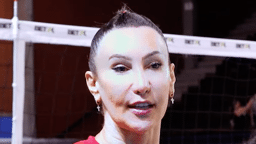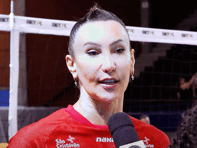On the first of Turkey’s two match points in the European Championship final in early Sept., Melissa Vargas saw her spike attempt blocked.
However, she was decisive on the second, ending opponents Serbia’s resistance and sealing a first-ever continental title for the team dubbed ‘the Sultans of the Net’.
Over 10,000 fans had packed into the Palas 12 arena in Brussels to witness a see-saw, five-set encounter that lasted over 2 hours and 20 minutes. Back home in Turkey, millions were watching on TV, including in Turkey’s biggest city Istanbul where giant screens were specially erected in parks and public spaces.
Cuban-born Vargas amassed 41 points in the EuroVolley final and was later named the tournament’s MVP. The image of her being lifted and hugged by teammate Ebrar Karakurt was one of the standout shots from the victory celebrations on court.
Get off the sidelines and into the game
Our weekly newsletter is packed with everything from locker room chatter to pressing LGBTQ sports issues.

But their joy and that of their fervent supporters wasn’t shared across the whole population.
For many conservative voices, the women’s national volleyball team has become a lightning rod in their ongoing attempts to marginalise LGBTQ people.
As a Muslim-majority country, Turkey has long been one of the more challenging places in which to grow up gay, even though homosexuality was decriminalized there in the 19th century.
There are still no anti-discrimination laws to protect LGBTQ people and since the AK Party (or Justice and Development Party) began its dominance of Turkish politics 20 years ago, the situation has worsened, with Pride parades banned and freedom of expression restricted.
In the most recent annual Rainbow Europe rankings, in which ILGA-Europe assesses what everyday life is like for LGBTQ people in 49 European nations based on human rights legislation, social attitudes and other factors, only Azerbaijan ranked below Turkey.
It’s no surprise therefore that the volleyball team’s popularity has soared with more secular Turkish sports fans, or that Vargas and Karakurt have been taken so closely to the hearts of LGBTQ women in Turkey in particular.
This was reflected in a short video shared on Instagram recently by Sportif Lezbon, an Ankara-based soccer club that was the first in the country to state openly that it is for people from the LGBTI+ community.
In the video, posted a couple of days after the EuroVolley final, a group of Sportif Lezbon players are all seen wearing masks of Vargas and Karakurt, dancing to celebratory music. The players were tagged in, while the accompanying caption translates as: “When they became champions, we became champions and “we are talking politics”.”
Selin Yildiz is the co-founder of the club. She told Outsports that after the devastating earthquake in February in which over 50,000 Turks lost their lives and many thousands more were injured or displaced, and the tensions exacerbated by an election that went to a runoff before President Erdoğan again emerged triumphant in May, the volleyball team has become a much-needed symbol of hope.
“One of the social groups that Erdoğan and AK Party politicians mentioned most before, during and after the election was LGBTI+ people,” she explained.
“A perception was created in society that there was an LGBTI+ threat to Turkish families and society. Although there is no such reality in Turkey, the discourse that gender reassignment under the age of 18 is a threat to children was imported from the U.S..
“Governments such as Turkey’s thrive on polarization and marking an enemy. This is how they mobilize their own supporters.”
This week, Erdoğan has been at the United Nations and was even complaining about the color scheme for the Sustainable Development Goals (SDGs) Summit, describing it as “the LGBT colors” to a Turkish broadcaster and saying it was an issue that “bothered” him.

There are in fact 17 different colors in the SDGs palette wheel, each assigned to one of the goals. The steps leading up to the entrance to the UN General Assembly were also decorated in these colors for the Summit.
The rise in this type of anti-LGBTQ rhetoric has coincided with the volleyball team’s ever-improving results. After being narrowly beaten in the Olympic quarterfinals two summers ago, they reached the last eight of the World Championships, won the Nations League tournament, secured that European title in dramatic fashion, topped the FIVB World Rankings, and have sealed their place at Paris 2024.
In the qualifying competition in Tokyo, they swept aside Brazil — the reigning Olympic silver medalists — in straight sets Friday and then saw off Japan Saturday to maintain a perfect record in Pool B and guarantee one of the 12 berths available in next year’s Olympic volleyball tournament.

The unconventional Karakurt has been a central figure throughout. Her visibility through social media, with pictures of her hair dyed blonde or bright pink as well as a photo in 2021 that was said to show her with her then-girlfriend but which was subsequently deleted, has also made her a “target”, according to Yildiz.
“Ebrar did not make a statement about her sexual orientation, but she didn’t reject the homosexuality discourses pointed at her like a weapon.
“Women’s volleyball players have come to represent a secular spirit in Turkey. For a group of people, women volleyball players shouldn’t dress like that, shouldn’t look like that, and women shouldn’t even play sports.
“Their success is very valuable, especially in dispelling the despair among the opposition.”
I’m on top, your voice is not heard. 🇹🇷 pic.twitter.com/ctDsL286Sy
— Ebrar Karakurt (@karakurtebrar18) September 3, 2023
The knock-on empowerment effect for a club like Sportif Lezbon was important to reflect in their video, she added.
“We are a community that struggles for visibility in the field of LGBTI+ and sports in Turkey.
“We are party to the discussions that started over Ebrar and Vargas. We are trying to contribute to a society where women and LGBTI+ people can do sports freely and safely without hiding themselves.
“This contribution has a political side. We know that being visible and winning medals is a gain for LGBTI+ people and women, both inside and outside of sports.”
Although most Turkish media outlets have been enthusiastic about the volleyball team, many writers for the pro-government titles have steadfastly stuck to their dissent.
On the day of the EuroVolley final, one journalist for daily newspaper Yeni Safak (‘New Dawn’) even decried a simple pre-match social post from the Turkish Volleyball Federation just because it carried an image of Karakurt, arguing that the player should not have been highlighted because of their sexuality and claiming that “this perversion has now taken precedence” over the team.
It’s one example of a line that several right-wing outlets have repeatedly taken, insinuating that Karakurt has some sort of subliminal influence on society, particularly Turkish youth.
Although Vargas has not been targeted to the same extent as Karakurt, the players’ close allegiance on and off court — amplified by appearances in each other’s social posts and interactions — has become part of the story in the last few weeks.

“There were people who could not digest this success and wished Serbia to win the [EuroVolley] final due to the hostility they show towards women and LGBTI+ people, which they reflect on social media and other media channels,” said Yildiz.
“Of course, Turkey’s win was also a meaningful success for LGBTI+ communities. These two athletes have not come out about their sexual orientation — it’s kind of an assumption. But this assumption is not rejected by either player. It’s important to underline this.”
Last weekend, a rally and march called the ‘Big Family Gathering’ took place in Istanbul. It was the second time such an event had been held; this time, less than three thousand people are estimated to have attended but it was afforded hours of live TV coverage.
The overarching claim put forward by organisers was that LGBTQ propaganda is gripping Turkish society. Just days before, Turkey’s education minister had announced the introduction of a new ‘Family’ module into the school curriculum.

“These groups have great media and government support behind them,” said Yildiz. “This march was even shown as a “public service announcement” on television channels.
“However, on the same day, LGBTI+ organizations organized a ‘Great Life Meeting’ live on YouTube. MPs, activists, artists and writers supported this online event.
“We’re trying to amplify a message of ‘life against hate.’”
Women’s volleyball has become a component of that counter-argument. The national team’s success is energizing the nation, and its key players have been unapologetic in their individual authenticity while contributing immensely to the team. There is a sense of exuberance and life-affirming passion within this story that translates beyond sport.
TÜRKIYE 🇹🇷!
— Volleyball World (@volleyballworld) September 23, 2023
They have QUALIFIED to the @paris2024 Olympic Games!
🥳 From #CloserToParis to #SeeYouInParis!
🏐 #Volleyball #FileninSultanları @karakurtebrar18 pic.twitter.com/eiKiCsscYV
For Yildiz and Sportif Lezbon, it’s also providing a way of “talking politics” that engages everyday people and fuels their belief that change can come through unity.
“We have to build bridges between feminism and LGBTI+ activism, and sports fields. As we build these bridges, we’ll become stronger together.
“Vargas or Ebrar’s struggle should also be our struggle, and our struggle should also be their struggle too.”







































